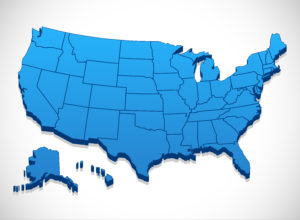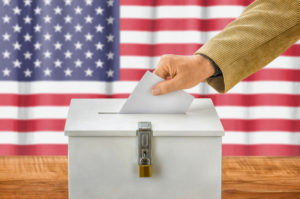Focus on Texas

Texas is the second largest state in the country by both area and population. Due to its size and geographic features, the state contains diverse landscapes common to both the U.S. Southern and Southwestern regions. Although Texas is popularly associated with the U.S. southwestern deserts, less than 10% of Texas’ land area is desert. Most of the population centers are in areas of former parries, grasslands, forests, and the coastline. Traveling from east to west, one can observe terrain that ranges from coastal swamps and piney woods to rolling plains and rugged hills, and finally the desert and mountains of the Big Bend.
Texas is nicknamed “The Lone Star State” to signify its former status as an independent republic, and as a reminder of the state’s struggle for independence from Mexico. The “Lone Star” can be found on theTexas state flag and on the Texan state seal. The origin of Texas’ name is from the word taysha, which means “friends” in the Caddo language.
Business Climate
Texas’ large population, abundance of natural resources, thriving cities and leading centers of higher education have contributed to a large and diverse economy. Ever since the discovery of oil at Spindletop, energy has been a dominant force politically and economically within the state.If Texas were its own country it would be the sixth largest producer of oil in the world.
Holiday Shopping & Online Sales Tax: An Overview of What You Need to Know

Now that we’re in the midst of the holiday shopping season, businesses and states are starting to see the effects of the Wayfair online sales tax decision. Looking back specifically at Cyber Monday, there are a lot of fascinating results regarding how states and businesses fared. Are states projecting an accurate amount of revenue?
It’s also worth noting how the new online sales tax laws will affect small internet retailers as they struggle to comply with various states’ laws during this busy holiday shopping time. How will they fare given the new regulations?
Cyber Monday & Online Sales Tax
While about two dozen new states are now collecting taxes from internet purchases as a result of recent economic nexus (Wayfair-like) legislation, there are major states (e.g. California, Texas and New York) that have not passed online sales tax legislation. Still, some retailers are choosing to collect taxes anyway, just to be safe.Read more
A Helpful Overview of the 2019 State Sales Tax Ranking

Over the past few years we’ve seen how companies have determined where to base operations based on considerations like sales tax, credits and incentives, and overall business climate. When it comes to running a business, which states are friendliest and which are most unfavorable?
The Tax Foundation’s 2019 State Business Tax Climate Index compiles various state details to offer a fascinating comparison for corporate leaders. Keep reading for an overview of how the various states stack up next to each other, especially in regards to sales tax.
2019 State Sales Tax Ranking
The Tax Foundation’s review of this year’s sales tax ranking includes a map with a helpful visual of each state’s placement on the list.Read more
Tis the Season to be Thankful!

Most of you who visit our blog are looking for insightful articles on State Tax matters. And I hope you agree that we generally deliver in that regard. But today, as this Thanksgiving week begins, I’m taking a moment to reflect on the many things I’m thankful for in my life and I wanted to share them in this space. We can probably agree that there’s currently not enough gratitude and true thankfulness in the world, and I think we need to get back to some of the basics – saying please and thank you (and meaning it), opening doors for each other (actual doors as well as those related to opportunities for others), treasuring our families (even when they don’t agree with our every belief), and opening our hearts and homes to those who are less fortunate – including our four legged friends!
FOCUS ON NORTH CAROLINA

The Tar Heel State is a southeastern U.S. state with a landscape ranging from Atlantic Ocean beaches to the Appalachian Mountains. Charlotte, the state’s largest city, is home to the NFL’s Carolina Panthers and museums, such as the NASCAR Hall of Fame. The state motto (“First in Flight”) honors the Wright Brothers, who flew their first plane in Kitty Hawk on the Outer Banks.
North Carolina provides a large range of recreational activities, from swimming at the beach to skiing in the mountains. North Carolina also offers everything from theme parks to lighthouses.
Business Climate
North Carolina is the leading U.S. state in the production of flue-cured tobacco and sweet potatoes, and second in the farming of pigs and hogs, trout and turkeys. In the three most recent USDA surveys, North Carolina also ranked second in the production of Christmas trees.
Important State Tax Measures to Watch on Election Day

Happy Election Day! I hope everyone was able to make it out to the polls or mail in their ballots for today’s midterm elections.
While we wait to see the results later today, I wanted to take a look at a few noteworthy state tax measures, initiatives, amendments and proposals across the country.
Carbon State Tax Initiative: Washington
Washington’s Initiative 1631 would impose a tax on carbon emissions from companies that either sell or use fossil fuels; it would be the first of its kind across the country.
What would this new state tax cost companies? The Tax Policy Center explains, “The proposed rate is $15 per metric ton of carbon emissions beginning in 2020 with $2 annual increases until the state meets its emissions target.” The Tax Foundation specifies the target as, “Reducing overall emissions to 25 percent below 1990 levels by 2035, and by 50 percent below 1990 levels (or 70 percent below the state’s expected emissions for that year) by 2050.”Read more
Update to Texas Jumping on the Economic Nexus Bandwagon!

Earlier this year, the Supreme Court handed down its landmark decision in South Dakota v. Wayfair Inc., which made it easier for companies to create nexus in states. In turn, this made it easier for states to collect revenue from companies doing business in these states.
In a previous blog, we reported that Texas is making plans to join many other states by jumping on board the economic nexus bandwagon. The Texas comptroller recently unveiled plans to move this legislation forward.
The New Legislation in Texas
Even though Texas has been moving cautiously in the move toward economic nexus, it is moving a little bit closer. Texas, one of the largest states and popular states for companies to do business in, has finally made plans to enact economic nexus legislation.
States' Reactions to Online Sales Tax: What You Need to Know

If you’ve been following the Wayfair case, you know the Supreme Court upheld South Dakota’s online sales tax legislation (related to economic nexus), creating precedent for other states to create and implement similar measures. But, as we explained in our last blog post, this doesn’t automatically mean all 50 states are charging taxes on internet purchases.
Which states are now collecting online sales tax, and how does this new ruling affect residents in states without sales tax? Keep reading to find out how some states are reacting to the Supreme Court’s ruling.
More States Begin Collecting Online Sales Tax
It’s not surprising that states are scrambling to create internet sales tax legislation to increase revenue as quickly as possible. As of October 1st, ten states joined the ranks of those requiring collection of sales tax if certain economic nexus thresholds are met:
- Alabama
- Illinois
- Indiana
- Kentucky
- Michigan
- Minnesota
- New Jersey
- North Dakota
- Washington
- Wisconsin
North Carolina, Connecticut, Georgia, Iola, Louisiana, Nebraska and Utah have legislation in place to require sellers to begin collecting taxes in the coming months, too.Read more
THE WAYFAIR CASE CONTINUES TO MAKE HEADLINES

It’s been over three months since the Supreme Court handed down its landmark decision in South Dakota v. Wayfair Inc., which made it easier for companies to create nexus in states. In turn, this made it easier for states to collect sales tax revenue from companies doing business in the state.
The Supreme Court’s ruling did not automatically make this the law of the land for all 50 states. The high court’s decision was that South Dakota’s economic nexus law was constitutional. Since this ruling, states have been jumping on the economic nexus bandwagon by enacting similar legislation. As we describe in a recent blog, economic nexus is based upon the amount of sales or number of transactions in the state. If a certain threshold is met, nexus is deemed to be created.
FOCUS ON KANSAS

This month brings us to the center of the country, the Great Plains state of Kansas. Kansas is a Midwestern state that epitomizes the U.S. Heartland with its Great Plains setting of rolling wheat fields. The Museum of World Treasures in Wichita, the state’s largest city, covers world history from dinosaurs to Elvis, while the open-air Old Cowtown Museum highlights the city’s pioneer past. In nearby Hutchinson, the Cosmosphere displays the Russian Vostok and Apollo 13 spacecrafts.
For thousands of years, what is now Kansas was home to numerous and diverse Native American tribes. Tribes in the eastern part of the state generally lived in villages along the river valleys. Tribes in the western part of the state were semi-nomadic and hunted large herds of bison.


















